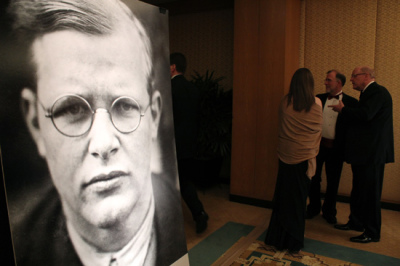Beware the nationalism trap: Political partisanship (pt 2)

We live in a season of great danger for the Church and the nation where it is planted.
When a Church, either as an individual congregation or as a wider body — like a denomination — gives itself totally to particular political partisanship, it loses its identity and function as the body of Christ and becomes instead a mere extension of the partisan entity to which it has given itself.
The Bride of Christ commits adultery when she beds down with anything other than Christ. Yet the seduction in our time is intense, as principles are forgotten in the passion of pressing issues.
The desperation is so great some dream of Christian nationalism in which Church and state are one. Winston Churchill’s great-grandson, Jonathan Sandys, and I explored this in our book, God and Churchill: Hitler’s dream was to co-opt the church for the sake of the National Socialist state. His intent was made clear in his book Mein Kampf. He proposed creating a new, more "modern" faith, based on his own beliefs.
Hitler openly threatened the Church not just in Mein Kampf, but also publicly in speeches. On one such occasion, he made a clear division between the responsibility of Church and State, professing that the State was to be a law unto itself:
"...the National Socialist State will relentlessly deal with those priests who, instead of serving the Lord, see their mission in propagating derisive comments on our present Reich, its institutions, or its leading men. It will bring to their attention the fact that the destruction of this State will not be tolerated … To destroy the enemies of the State is the duty of the State.’[1]
Jonathan and I wrote:
"Significant voices in the Church in Germany attempted to stand against what Hitler was promoting. Those who did paid with their lives, like Dietrich Bonhoeffer. In July 1933, Hitler unconstitutionally forced new church elections and Bonhoeffer made every attempt to muster support for independent, non-Nazi candidates. Sadly, his efforts were in vain. Hitler had rigged the election and an overwhelming majority of key church positions were given to the ‘German Christians’, those based firmly in the Nazi camp."
Following the election result, Bonhoeffer became involved in the Bethel Confession, which opposed the “German Christian” movement and affirmed God's faithfulness to Jews as His chosen people. Bonhoeffer helped craft the Confession, which was then submitted to theologians who succumbed to fear and moderated its strong opposition to the Nazis. "Bonhoeffer," notes Eric Metaxas, "was so horrified that he refused to work on the final draft."[2]
The lines are clear for Churches that pursue a biblical vision when it comes to moral and social positions that go to the very heart of biblical principles like the fundamental right to life, marriage, and sexual behaviors. However, the lure of power distorts the Church’s identity from seeking to walk in the nation as the body of Christ to becoming a nationalist institution that aims to dominate the country like any other partisan group.
This is a delicate balance: Churches should not be so “transcendent” that they are aloof and detached from the political processes, but neither are they to be so “immanent” that they are nothing more than an extension of a party or state.
The danger is especially high when a particular candidate espouses (or seems to) the principles for which the biblical Church campaigns. However, there is peril when the Church goes beyond support of a favored policy and becomes officially wed to the party of that candidate.
For the sake of the nation, Churches must dare to speak against candidates when they violate biblical moral and spiritual standards.
Sadly, Pope Francis pulled back recently from mentioning Catholic Joe Biden’s support of abortion when he met with Biden.
John F. Kennedy and Lyndon Johnson often abandoned biblical principles in personal behavior as well as policy, while important segments of the liberal-left Church supported them without challenging their morality — or lack of it.
Donald Trump has enjoyed the support of conservative-right Churches, yet in speech and behavior, Trump has sometimes made a mockery of biblical principles and embarrassed Christians who supported him.
Richard Nixon worked hard to co-opt Billy Graham, yet the Oval Office tapes revealed that in language and thought Nixon embraced beliefs and practices Graham preached against as violating God’s standards.
The Roman Catholic Church should not support candidates who take communion, then violate in behavior and policy the sanctity of that sacrament. Neither should evangelical Churches — or any — give approval to politicians who claim the faith but show no fruit of salvation.
Such situations reveal that the only partisanship of the Church should be the partisanship of Christ’s Kingdom, that of righteousness-justice, peace, and Spirit-given joy. (Romans 14:17)
When candidates support those values in policy and personal behavior and recognize their transcendent source, Churches should support them, but not fall into the trap of giving themselves to his or her party.
As noted in Part One of this series, the practical model for this complex relationship between what we would now call “Church and state” is revealed upon the Hebrews’ return to Jerusalem from 70 years of the Babylonian captivity, found in Zechariah 4.
In Part 3 we dig down into this revelation from God and uncover practical treasures essential for our understanding of Church and state in this complicated, confusing age that we inhabit.
[1] Max Domarus, The Complete Hitler: Speeches and Proclamations, 1932-1945, The Chronicle of a Dictatorship, trans. Mary Fran Golbert. (Bolchazi-Carducci Publishers, 1990), 1451.
[2] Bonhoeffer: Pastor, Martyr, Prophet, Spy, 185.
Wallace B. Henley, a former White House and Congressional aide, is the author or co-author of more than 20 books. His latest is Who Will Rule the Coming ‘Gods’: The Looming Spiritual Crisis of Artificial Intelligence, just released by Vide Press.
For media inquiries, contact: ChristianPost@pinkston.co





















